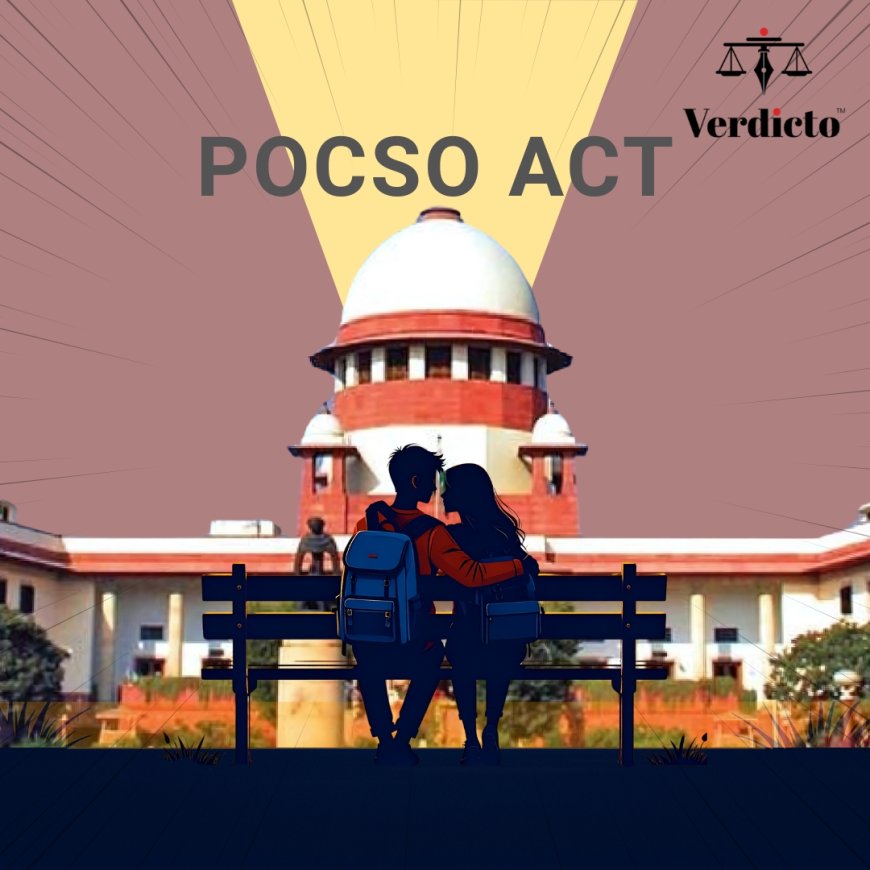Is It Time to Rethink the Age Bar in the POCSO Act?
Author of this article is Advocate Neyha Chaudhary, she is a criminal law specialist and Panel Advocate with DLSA, Gurugram. A certified POSH trainer, she focuses on POCSO, sexual harassment, and legal awareness. She is also the founder of N Legal Solutions™.

New Delhi: In order to protect children under the age of eighteen from sexual abuse and exploitation, the Protection of Children from Sexual Offences Act, 2012 (POCSO Act) marked a turning point in Indian legislative history. Nevertheless, the Act's current version has a zero-tolerance stance, making all types of sexual behavior involving minors illegal, even in cases when the relationship is consensual and not exploitative. Due to this, many teenage males have been tried and found guilty, which has brought up serious issues with proportionality, fairness, and the need for legislative recalibration.
I. The Ground Reality: Mutual Consent or Crime?
Teenagers in voluntary romantic relationships are the subject of an increasing number of POCSO prosecutions in India. The law makes no exceptions, even in cases where the "victim" backs the accused, even in the absence of abuse, coercion, or force.
According to a 2022 study by Enfold Proactive Health Trust and UNICEF India that included cases from West Bengal, Maharashtra, and Assam, 24.3% of POCSO cases involved "romantic cases" involving mutual consent, and 93.8% of the accused were found not guilty in these cases, indicating that judges were uncomfortable with making consensual adolescent relationships illegal.
Adolescent boys make up the majority of minors booked under POCSO, according to National Crime Records Bureau (NCRB) figures for 2021. This suggests that the strict interpretation of the law has resulted in reverse victimization.
II. Supreme Court and High Court Viewpoints
Several courts have raised concerns over the misuse and overreach of the POCSO Act in consensual adolescent relationships:
1. Independent Thought v. Union of India (2017) 10 SCC 800
The Supreme Court acknowledged the evolving capacities of adolescents and highlighted the need for child-centric interpretations of the law. Though the case involved marital rape of a minor, it opened the door to discussing adolescent agency.
2. Satish Ragde v. State of Maharashtra (2021)
The Supreme Court stressed that the purpose of the POCSO Act is protection—not punishment—of children, and interpretation must align with the Act’s objective.
3. Vishnu v. State of Maharashtra (2019 SCC OnLine Bom 3102)
The Bombay High Court held that equating consensual teenage relationships with heinous offences would result in miscarriage of justice.
4. Sajid v. State of Haryana (2022)
The Punjab and Haryana High Court recognized the consensual nature of the relationship and granted relief, noting the absence of any element of coercion.
5. X v. State of Maharashtra (2022 SCC OnLine Bom 186)
The Court granted bail to a 17-year-old boy involved with a 16-year-old girl, observing that criminal prosecution in such cases is harsh and counterproductive.
III. Zero Tolerance and Overcriminalization
The POCSO Act's zero-tolerance policy eliminates any opportunity for judicial discretion in interactions between consenting adolescents. Teenagers are imprisoned as a result of their natural displays of affection.
• Permanent criminal records for non-exploitative acts.
• Disruption to education, trauma, and shame for both parties.
POCSO is frequently used as a tool to regain social control when parents file complaints after learning of relationships that are socially undesirable, intercaste, or interfaith.
IV. Rural India: A Vacuum of Awareness
The issue is made worse in rural and semi-urban areas by a lack of knowledge about the POCSO Act:
• Police, educators, and Panchayat members frequently lack the necessary training to differentiate between mutual adolescent conduct and exploitation; many families file complaints without realizing that consensual relationships are included by the POCSO framework.
This lack of legal knowledge contributes to erroneous prosecutions and clogs the courts with preventable cases.
V. Role of Parents, Schools, and NALSA
Addressing the misapplication of the POCSO Act requires coordinated effort:
- Parents must be sensitized to adolescent psychology, legal implications, and the damage caused by hasty legal action in consensual matters.
- Schools must integrate comprehensive sex education and legal literacy into their curriculum to educate students about consent, bodily autonomy, and the law.
- NALSA (National Legal Services Authority) and SLSAs (State Legal Services Authorities) should:
- Conduct legal awareness camps in schools and communities.
- Provide free legal aid to juveniles caught in such cases.
- Advocate for policy reform at the national level.
VI. The Way Forward: A Calibrated Legislative Reform
To strike a balance between protection and proportionality, the following recommendations are proposed:
- Introduce a “Close-in-Age” Exemption: Similar to the “Romeo and Juliet” clause in other countries, the law must exempt consensual sexual activity between adolescents aged 16–18 if the age gap is minimal (e.g., 2–3 years), and there is no abuse or manipulation.
- Restorative Justice Framework: Instead of punitive incarceration, adopt a framework of counseling, community service, and behavioral training in cases where no violence or coercion is involved.
- Judicial Discretion Clause: Allow courts to examine the context and nature of the relationship before applying mandatory minimum sentences.
Conclusion
The POCSO Act was written with the admirable goal of shielding kids from serious abuse. But in its current form, it is being used more and more to disrupt lives, criminalize adolescent love, and put harmless lads in jail. Laws must change with society. To make sure that the law acts as a shield rather than a sword, it is essential to acknowledge adolescent agency, allow for informed legal judgment, and integrate sex education and community awareness. In order for justice, compassion, and protection to coexist under the aegis of child rights, it is time to think and change.
Author of this article is Advocate Neyha Chaudhary, she is a criminal law specialist and Panel Advocate with DLSA, Gurugram. A certified POSH trainer, she focuses on POCSO, sexual harassment, and legal awareness. She is also the founder of N Legal Solutions™.







